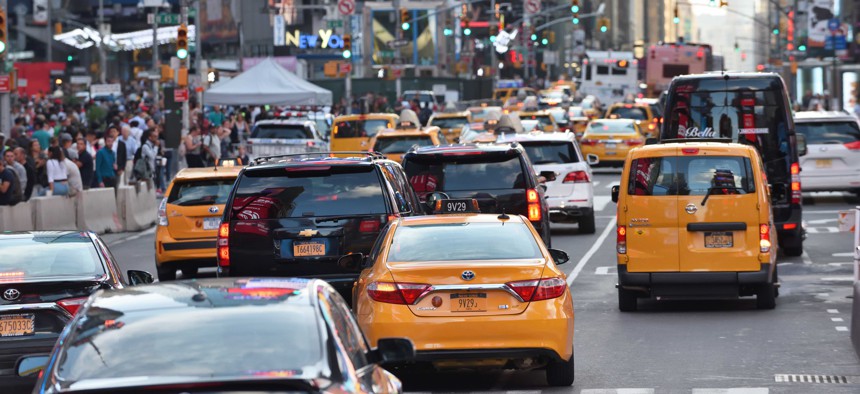Self-Driving Vehicle Tests Poised to Begin Next Year in New York City

Traffic in midtown Manhattan during August, 2017. Shutterstock / astudio
"Testing in New York will accelerate the timeline to deploying self-driving cars at scale,” according to the CEO of Cruise Automation.
General Motors Co. and subsidiary Cruise Automation, Inc. are applying to test highly automated vehicles in the New York City borough of Manhattan beginning early next year.
New York Gov. Andrew Cuomo announced the plan on Tuesday. It would mark the first time so-called “Level 4” automated vehicles would be tested in the state. GM and Cruise are seeking permission to operate the vehicles under a pilot program created by legislation included in New York state’s fiscal year 2018 budget.
There will be an engineer in the driver's seat and a person in the passenger's seat of any vehicles tested, according to Cuomo's office.
Kyle Vogt, the CEO of Cruise Automation, said "testing in New York will accelerate the timeline to deploying self-driving cars at scale.”
“New York City is one of the most densely populated places in the world and provides new opportunities to expose our software to unusual situations,” he added in a prepared statement, “which means we can improve our software at a much faster rate.”
GM acquired Cruise Automation last year. The autonomous vehicle technology firm was founded in 2013 and is based in San Francisco.
New York City Mayor Bill de Blasio’s office did not immediately respond to questions about whether the mayor knew about plans to test the robotic vehicles on the city’s streets. Cuomo and de Blasio, both Democrats, have tussled previously over an array of issues.
Definitions the U.S. Department of Transportation adopted last year, describe a vehicle with Level 4 automation technology as able to perform all driving functions under certain conditions, although a human driver may have the option to take over control of the vehicle.
New York is not alone as it moves toward having more automated vehicles on its streets.
Uber Technologies, Inc. has been experimenting with self-driving vehicles in San Francisco. The company has also deployed the vehicles in Pittsburgh, where self-driving car research at Carnegie Mellon University dates back about three decades.
Uber’s chief rival, Lyft, Inc., said last month it would partner with a company called Drive.ai to begin dispatching self-driving cars in the San Francisco area. Other companies have carried out automated vehicle tests elsewhere in the U.S., including Arizona and Michigan.
In recent weeks, congressional lawmakers in the House and Senate have been pushing to develop new national standards for self-driving vehicles. At least one group tracking legislation that is emerging has raised questions about how it might complicate the ability of state and local governments to enforce traffic laws for the vehicles.
PREVIOUSLY on Route Fifty:
Bill Lucia is a Senior Reporter for Government Executive’s Route Fifty and is based in Washington, D.C.
NEXT STORY: Nobel for Behavioral Science Holds Lessons for Local Governments






